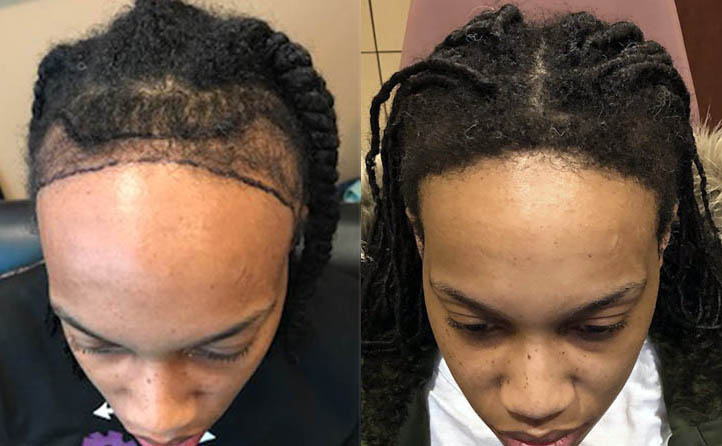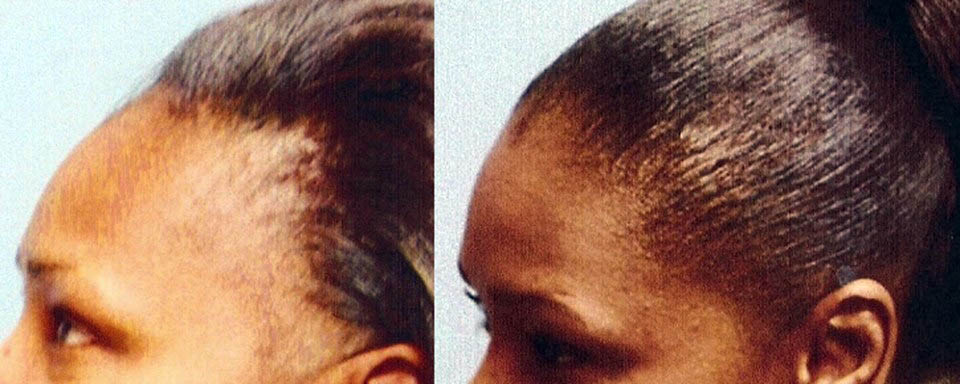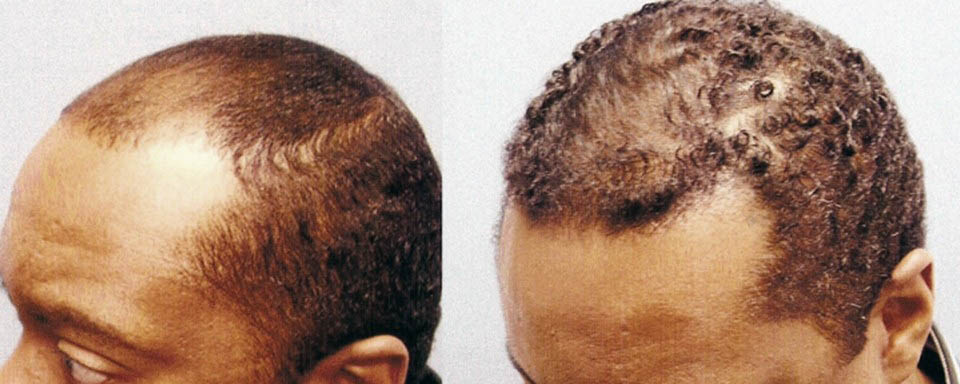African American Hair Transplants

Traction Alopecia – Hair Loss on the Edges
Traction alopecia results from repeated tension or pulling on hair follicles. It commonly occurs in those who frequently wear tight hairstyles like braids or weaves. Other sources of tension, such as hair extensions or hats, can also contribute.
Symptoms vary but often include scalp thinning, bald spots, itchiness, soreness, and potentially scarring.
Understanding Traction Alopecia and Its Causes
Traction alopecia is a form of hair loss caused by prolonged tension or pulling on the hair follicles. This condition often affects the edges of the scalp, particularly among individuals who frequently wear tight hairstyles like braids, ponytails, or weaves. Additional factors such as hair extensions, hats, or headgear that apply constant pressure can also contribute to this type of hair loss. Over time, the repeated stress damages the follicles, leading to thinning hair, bald spots, or even permanent loss if left untreated.
Effective Treatments for Traction Alopecia
Treating traction alopecia begins with eliminating the behaviors that caused it. This includes avoiding tight hairstyles, discontinuing the use of hair extensions, and allowing the scalp to recover from tension. For mild cases, hair often regrows naturally once stress on the follicles is relieved. However, more advanced cases may require topical or oral medications to stimulate regrowth. In situations where scarring has occurred, hair transplant surgery may be the best option for restoring a natural hairline.
Specialized Care for Ethnic Hair Textures
Traction alopecia is particularly common among individuals with certain ethnic backgrounds who frequently use braids, twists, or weaves. Dr. Katona specializes in treating African American patients and those of African ancestry, providing tailored solutions that respect the unique characteristics of textured hair. His expertise in advanced hair transplant techniques ensures natural-looking results while addressing the specific needs of each patient.
Treatment for Traction Alopecia
Treatment involves stopping the behavior causing hair loss, such as avoiding tight hairstyles or removing extensions. Hair may regrow naturally once tension is relieved, but in severe cases, topical or oral medications or hair transplant surgery may be necessary.
Seeking professional medical advice is crucial for early intervention and successful treatment.
For patients with certain ethnic backgrounds and hair textures, consulting a skilled hair transplant surgeon, like Dr. Katona, is essential. He specializes in customized hair loss solutions for African American patients and those of African ancestry, utilizing techniques tailored to their unique needs for natural-looking results.
If you’re experiencing hair loss and seek expert advice tailored to your hair type, we encourage you to contact us for a consultation.
It can be particularly beneficial for patients of certain ethnic backgrounds and hair textures to seek out a skilled hair transplant surgeon who is well-versed in addressing the entire range of hair loss patterns, transplant obstacles, and hair reconstruction objectives in order to achieve the best outcome possible. Dr. Katona possesses a deep understanding of the various techniques necessary to create top-quality hair transplants for all hair varieties. His specific area of expertise lies in customized hair loss solutions for African American patients and patients of African ancestry. To achieve successful hair transplantation for those with this hair type, a comprehensive understanding of the unique hair loss matters they may be experiencing is critical, as well as the transplantation techniques that are most conducive to creating a natural and stylish appearance.
A healthy scalp is essential for hair regrowth, especially in cases of traction alopecia. Keeping the scalp clean, moisturized, and free from buildup can help create an optimal environment for hair follicles to thrive. Using gentle, non-irritating shampoos and conditioners can minimize further damage. In addition, topical treatments that promote circulation, such as oils or growth serums, may help stimulate hair growth in affected areas. Ensuring your scalp remains in good health can aid the recovery process and improve overall hair quality.
In cases of severe traction alopecia where scarring or permanent hair loss has occurred, hair transplant surgery offers a viable solution. During this procedure, healthy hair follicles are transplanted to the areas where hair loss has taken place. Dr. Katona’s expertise ensures that the surgery is customized for each individual’s needs, offering natural-looking results that blend seamlessly with existing hair. For many patients, this can be the key to regaining a full and healthy hairline after the lasting effects of tension-induced hair loss.
The psychological impact of hair loss, especially from traction alopecia, can be profound. Hair is closely tied to self-image and confidence, and experiencing thinning or bald spots along the edges of the scalp can lead to feelings of frustration or insecurity. Addressing the physical aspect of hair loss through treatment is important, but it’s also crucial to consider the emotional side. Consulting with a medical professional like Dr. Katona not only provides a path to restoring your hair but also offers the opportunity to regain your confidence and peace of mind. Treating both the physical and emotional impacts of hair loss can help individuals fully recover and feel empowered.
If you’re experiencing hair loss and want to consult with a hair restoration expert who is knowledgeable about hair transplants specifically tailored to African American patients and patients of African descent, we encourage you to contact us to book a consultation.

Hair Transplant Procedure
The procedure involves transplanting hair follicles from a donor area (typically the back of the head) to the recipient area. Results may vary based on the individual’s hair type and surgeon’s experience with African American hair. It is important to find a reputable and experienced hair transplant surgeon to ensure a successful outcome.
Dr. Katona performs only FUE hair transplant which extracts individual follicles and has minimal scarring.


